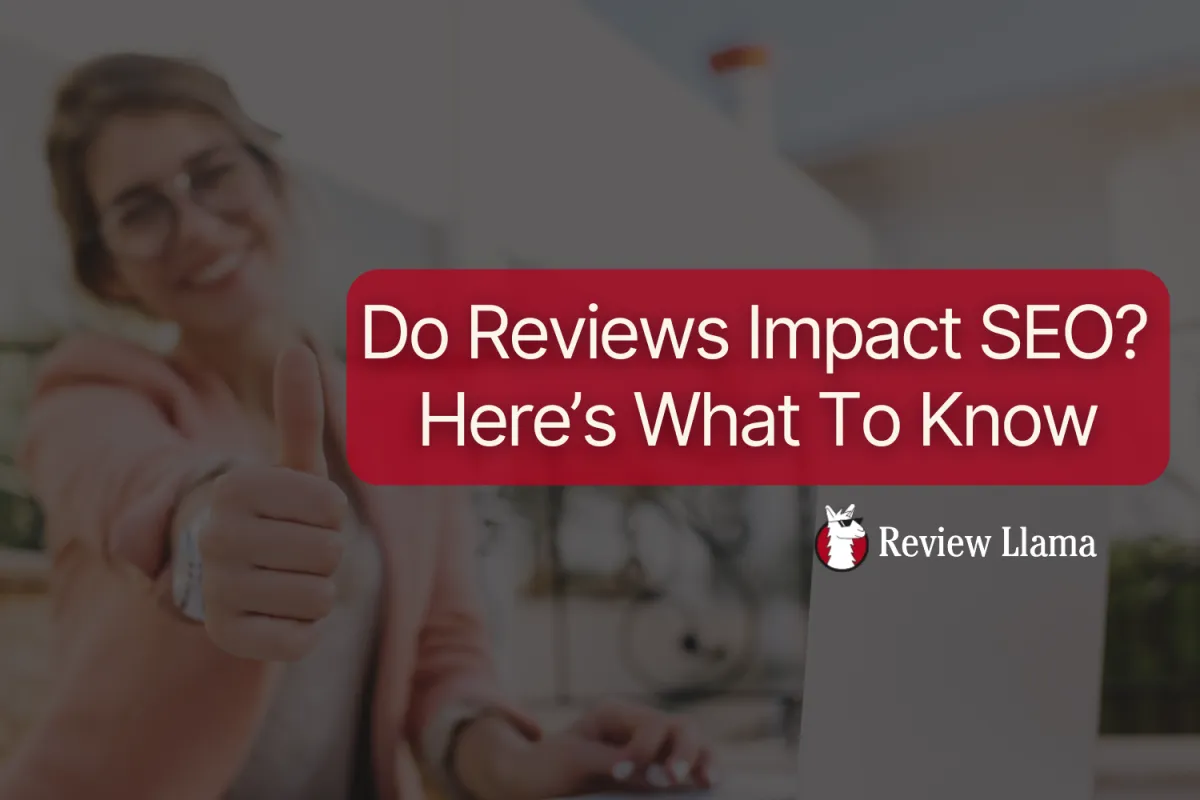
Do Reviews Impact SEO? Here’s What To Know
Do reviews really change how people see your business? And are they strong enough to affect your sales and search ranking?
Your ranking in Google depends on many signals. The algorithm looks at dozens of factors to decide who shows up first. That makes it hard to know where to focus. But one factor you can’t ignore is your online reputation.
Whether you like it or not, your reputation speaks for your business before you do. Customers often want reassurance before they buy. So they search for you on Google, Yelp, or Trustpilot — now even on social media! — to see what others are saying.
The numbers make it clear:
98% of people at least occasionally read reviews for local businesses (BrightLocal)
Review signals make up 17% of Google’s Local Pack ranking factors (Whitespark)
93% of consumers read reviews before making a purchase (Podium; Dixa)
That’s too big to ignore. Your reputation can either pull customers in or push them away.
In this article, we’ll look at how reviews affect your SEO rankings, why they matter more than ever, and what you can do to protect your business. If you’d like professional advice for your business, contact us — we’d be glad to talk!

Why Your Online Reputation Matters for SEO
Search engines like Google are built to give people the best possible results. That doesn’t just mean showing the most relevant business; it means showing the most trustworthy one.
To figure that out, Google looks at many signals, including the content on your site, backlinks, and how people engage with your business online. Reviews are a major part of that picture.
Even though consumer trust in reviews compared to personal recommendations has shifted over time, reviews still carry influence. People read them, weigh the details, and use them to inform their decisions. Google takes note of this behavior, which is why review signals — things like quantity, freshness, and diversity — continue to play a role in local search rankings.
In short: the better your reputation, the better your chances of showing up when customers search for businesses like yours.
The Impact of Reviews: Positive vs. Negative

The Benefits of Positive Reviews
Positive reviews act as signals to both customers and search engines. When reviews are steady, recent, and positive, they tell Google that your business is:
Active. Fresh reviews show you’re engaging with real customers now, not years ago.
Relevant. Keywords in reviews (“great HVAC service in Nashville”) reinforce what your business does and where.
Trusted. A consistent pattern of positive feedback builds authority, which helps rankings in local search.
The Risks of Negative Reviews
Negative reviews send different signals. If they pile up or go unanswered, they can suggest to Google that:
Your service quality is inconsistent. Frequent complaints point to ongoing issues.
Your business may not be credible. Low ratings reduce trust, both for users and search engines.
Competitors may achieve a better result. If other businesses have stronger review profiles, Google has reason to show them higher.
Unmanaged negative reviews don’t just hurt reputation but weaken the trust signals Google uses to decide who ranks.
The takeaway? Reviews shape how customers see you and how Google ranks you. Positive reviews strengthen the signals that push you higher in search, while negative ones weaken them.
That’s why it’s not enough to hope for good feedback. You need a plan to manage your reputation. Let’s look at practical steps you can take to improve and protect it.
How To Improve (And Protect) Your Online Reputation

The best approach to reputation management is having a strategy, not just reacting when something goes wrong.
A strong reputation strategy covers three areas:
Encouraging positive feedback. Make it easy for satisfied customers to leave reviews by asking at the right time and through the right channels.
Managing negative reviews. Address complaints quickly, openly, and respectfully. A good response can turn criticism into a chance to show you care.
Building consistency. Keep reviews coming in steadily. Fresh, recent feedback tells both customers and Google that your business is active and trustworthy.
Pro Tip: The most effective reputation strategies run on systems, not guesswork. Tools like Review Llama help automate review requests, filter out unhelpful feedback, and give you one place to monitor and respond. You can even hand customers a simple tap-to-review NFC card or display a QR code at checkout, making it effortless for them to leave feedback in the moment.

Review Llama NFC Card: customers can leave a review instantly with a quick tap or scan.
With the right system in place, you’re not just reacting to reviews. You’re actively building a reputation that supports both trust and search visibility.
Final Thoughts: Reputation as a Ranking Factor
Your online reputation isn’t just about what customers say: it directly affects how visible your business is in search results.
Positive reviews send signals of trust, activity, and relevance. Negative reviews, if left unmanaged, can weaken those signals and give competitors the edge.
The bottom line: managing your reputation is not optional. It’s part of how Google decides who gets seen and who gets skipped.
If you want to protect your reputation, climb higher in search rankings, and make reviews work for your business instead of against it, you need a clear strategy and the right system in place.
Review Llama is a simple system that helps you ask for reviews at the right time, collect them through in-person or automated options, and keep track of everything in one place. If you’d like to see how this could work for your business, book a strategy session. We’d be glad to help!


